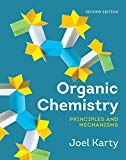
Concept explainers
(a)
Interpretation:
How the given synthesis can be carried out is to be suggested.
Concept introduction:
(a)
Interpretation:
How the given synthesis can be carried out is to be suggested.
Concept introduction:
Want to see the full answer?
Check out a sample textbook solution
Chapter 21 Solutions
Organic Chemistry: Principles and Mechanisms (Second Edition)
- (SYN) Show how to carry out each of the following transformations. (a) (b) ? ? (c) (d) ? ? CI HOarrow_forward(SYN) Suggest how you would carry out the synthesis shown here using any reagents necessary. Hint: The synthesis may require more than one synthetic step. ?arrow_forwardThe first step should be proton transfer. As I included in my work and the second step I think should be nucleophilic attack but I don't know how to continue on from there. Please but problem as a list of reactionsarrow_forward
- (SYN) Show how you would carry out the following transformations. Hint: Each transformation may require more than one reaction. (a) ? (b) ? ОН ОНarrow_forward(SYN) Show how to carry out each of the following syntheses, using any reagents necessary. Hint: In each case, the carbonyl group of a ketone or aldehyde is entirely removed. (a) (b) ? OCH3 OCH3 OCH3 OCH3 (c) (d) ? ? OH Pharrow_forward(SYN) Show how you would synthesize each of the following compounds from benzene.arrow_forward
- (SYN) Show how you would synthesize each of these compounds from benzene.arrow_forwardThe reaction shown here is an example of the Favorskii reaction, which involves an R¯ leaving group in a nucleophilic addition-elimination reaction. (a) Draw the complete, detailed mechanism for this reaction and explain why R can act as a leaving NaOH H2O group. (b) Suggest how you can synthesize an ester from cyclopropanone using only this reaction.arrow_forward(SYN) Show how to synthesize each of the following compounds beginning with malonic ester.arrow_forward
- (SYN) Show how to carry out each of the following transformations. (a) (b) ?. ? Br Br Br Br (c) ?arrow_forward(SYN) Show how to carry out the following conversion.Hint: Consider using a protecting group.arrow_forward(SYN) Show how you would synthesize each of these compounds, using butan-1-ol and benzene as your only sources of carbon.arrow_forward
 ChemistryChemistryISBN:9781305957404Author:Steven S. Zumdahl, Susan A. Zumdahl, Donald J. DeCostePublisher:Cengage Learning
ChemistryChemistryISBN:9781305957404Author:Steven S. Zumdahl, Susan A. Zumdahl, Donald J. DeCostePublisher:Cengage Learning ChemistryChemistryISBN:9781259911156Author:Raymond Chang Dr., Jason Overby ProfessorPublisher:McGraw-Hill Education
ChemistryChemistryISBN:9781259911156Author:Raymond Chang Dr., Jason Overby ProfessorPublisher:McGraw-Hill Education Principles of Instrumental AnalysisChemistryISBN:9781305577213Author:Douglas A. Skoog, F. James Holler, Stanley R. CrouchPublisher:Cengage Learning
Principles of Instrumental AnalysisChemistryISBN:9781305577213Author:Douglas A. Skoog, F. James Holler, Stanley R. CrouchPublisher:Cengage Learning Organic ChemistryChemistryISBN:9780078021558Author:Janice Gorzynski Smith Dr.Publisher:McGraw-Hill Education
Organic ChemistryChemistryISBN:9780078021558Author:Janice Gorzynski Smith Dr.Publisher:McGraw-Hill Education Chemistry: Principles and ReactionsChemistryISBN:9781305079373Author:William L. Masterton, Cecile N. HurleyPublisher:Cengage Learning
Chemistry: Principles and ReactionsChemistryISBN:9781305079373Author:William L. Masterton, Cecile N. HurleyPublisher:Cengage Learning Elementary Principles of Chemical Processes, Bind...ChemistryISBN:9781118431221Author:Richard M. Felder, Ronald W. Rousseau, Lisa G. BullardPublisher:WILEY
Elementary Principles of Chemical Processes, Bind...ChemistryISBN:9781118431221Author:Richard M. Felder, Ronald W. Rousseau, Lisa G. BullardPublisher:WILEY





